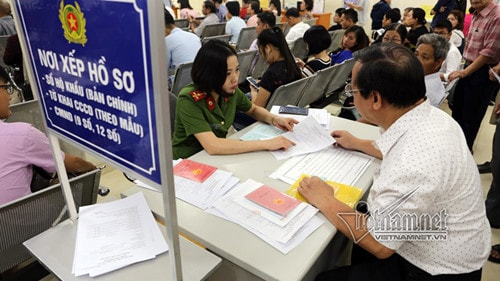What will happen after 'abolishing household registration books'?
"Abolishing household registration books" will require reviewing and amending a series of related regulations.
Along with reforming administrative procedures surrounding the household registration book, will we next have a roadmap to remove barriers that lead to differences in rights between permanent and temporary residents?
Recently, the Government issued Resolution 112/NQ-CP on simplifying administrative procedures related to population management under the functions of the Ministry of Public Security. In particular, the most concerned content is the abolition of the form of population management by registering permanent residence by "household registration book" and replacing it with the form of management through personal identification codes.
Many people expressed support but also had many worries and concerns. On the morning of November 7, the Ministry of Public Security held a press conference to give official information.
With the opinion of the leader of this Ministry,"abandon household registration books""In fact, it is a change in the means of population management towards a more modern direction, applying technological advances, and not implemented immediately but expected to be completed by 2020. This does not mean the loosening or abolition of population management activities according to the household registration system as many people initially imagined.
It can be said that this is a big, remarkable step forward in population management, from manual, mechanical, and mechanical methods to a more flexible, modern, and scientific direction. Accordingly, the cumbersome and troublesome paperwork, bureaucracy, and "parasitic" authority on household registration will gradually be reduced. Although the results are not yet known, for now, as long as administrative procedures are "less cumbersome", people have enough reason to be happy.
In another aspect, this is an inevitable step in the roadmap to build e-Government, which is closely linked to administrative procedure reform.
 |
| Illustration: Pham Hai |
However, it is certain that administrative reform is not simply about removing or eliminating one or several documents. It can only achieve the goal of bringing convenience and ensuring people's rights when accompanied by real innovation in management thinking.
The same is true in this case. The public is too excited about the news of abolishing a document that brings them too much trouble, but they forget that the household registration book does not actually create that. The household registration book is simply a tool that represents an outdated way of thinking about population management.
The root of the problem lies in the way that public authorities associate and equate population management tools with conditions for people to exercise their rights. Therefore, the household registration book, from its role as a population management tool and guarantee of residency rights, has become a barrier to people's access to rights.
Therefore, a question that many people are asking is, along with reforming administrative procedures surrounding the household registration book, will we next have a roadmap to remove barriers that lead to differences in rights between permanent and temporary residents? As in a 2016 article, Associate Professor, Dr. Vo Tri Hao, who has been struggling with the issue of abolishing the household registration book for many years, analyzed: “It is necessary to clearly distinguish the concept of what a household registration book is.
Accordingly, there are two aspects. The first aspect is to manage residence, the second aspect is to link household registration with the benefits enjoyed in the locality where one lives. In my opinion, the second aspect is the one that is worth opposing.” Therefore, according to Mr. Hao: “Abolishing here is to abolish household registration according to the second aspect, not to abolish residence management, because if we abolish residence management, we will know where people live.”
Population management is an essential activity of the state, but it must be operated on the basis of respecting and ensuring people's rights. Population management data helps the state build a vision, strategy and activities to ensure maximum citizen rights. This should be considered as a guideline for choosing management methods and applying them to reform activities.
Moreover, reform must be implemented in a coordinated manner, both in terms of people and regulatory systems.
In terms of human resources, there must be unity among the civil servants in the spirit of reform. Reality shows that if the Central Government directs but the local authorities remain calm, then businesses and people will suffer.
In terms of the regulatory system, the number of administrative procedures related to the household registration book is currently extremely large. It seems to be associated with the entire life cycle of a person, from birth to death. From procedures for registering birth, death, marriage, marital status, guardianship, civil status, adoption, will authentication, confirmation of poor households, vocational training for the poor, application for social benefits, confirmation of students in difficult circumstances to get credit loans, mortgage contract authentication, application for funeral expenses...
“Abolishing the household registration book” will require a review and revision of a series of related regulations. Because if there is no consistency in the implementation, the social consequences will be unpredictable, with the risk of turning people from a state of “difficulty accessing rights” to “no access” to rights, due to lack of household registration.
Hopefully with high determination, the Government will have a long-term vision and a reasonable roadmap in implementing policies that please the people.
A survey conducted by the World Bank and the Vietnam Academy of Social Sciences in five provinces and cities, namely Hanoi, Ho Chi Minh City, Da Nang, Binh Duong and Dak Nong, published on June 16, 2016, showed that there are at least 5.6 million people without permanent residence registration at their place of residence, of which the rate in Ho Chi Minh City is up to 36% of the population, and in Hanoi it is 18%. 70% of the surveyed people said that this book limits their rights, makes them unequal to those with permanent residence registration and creates a basis for negativity and corruption. Household registration books are unfamiliar to many developed countries, VTV.vn, June 17, 2016. |
According to Kienthuc.net.vn


.jpg)





